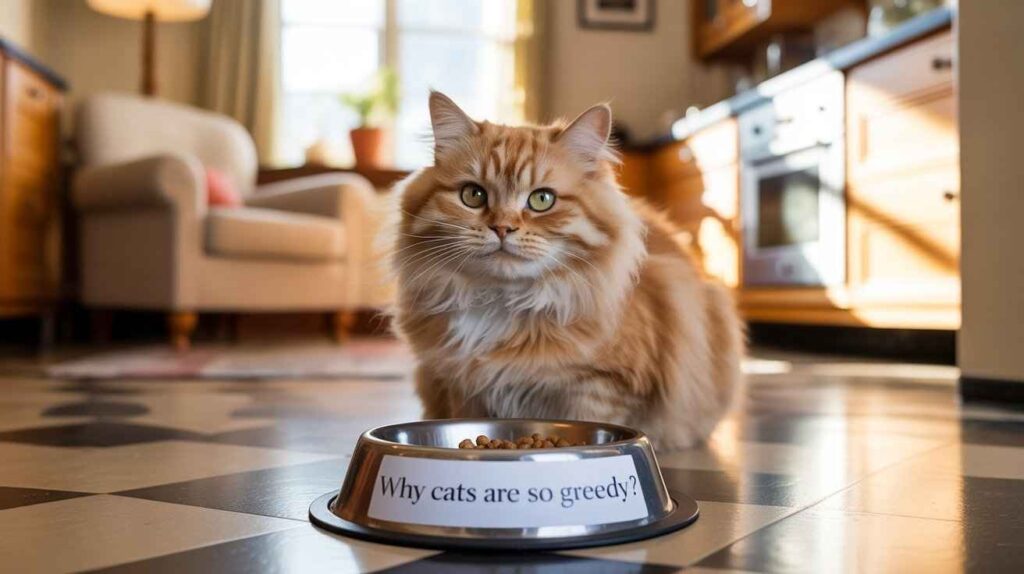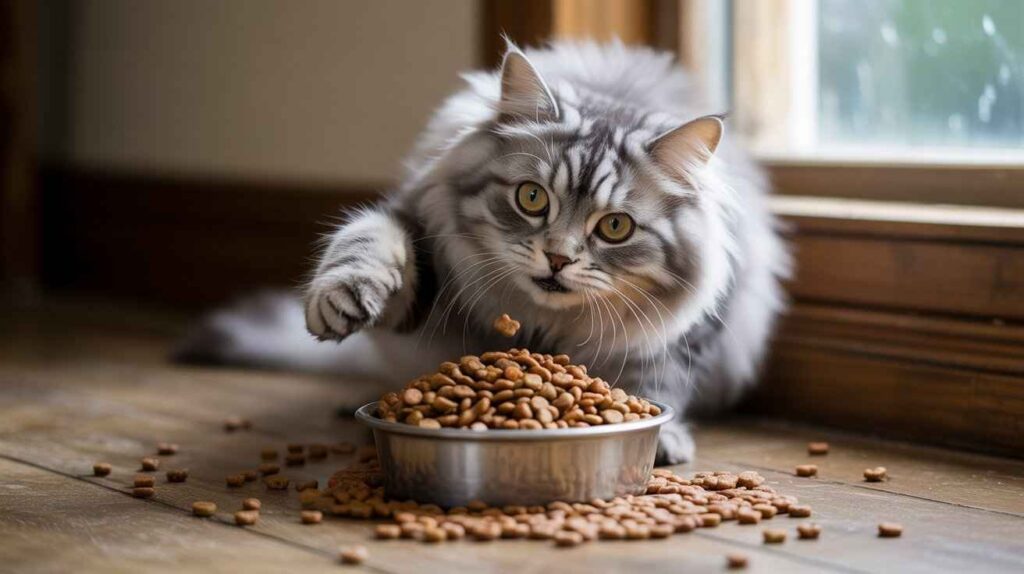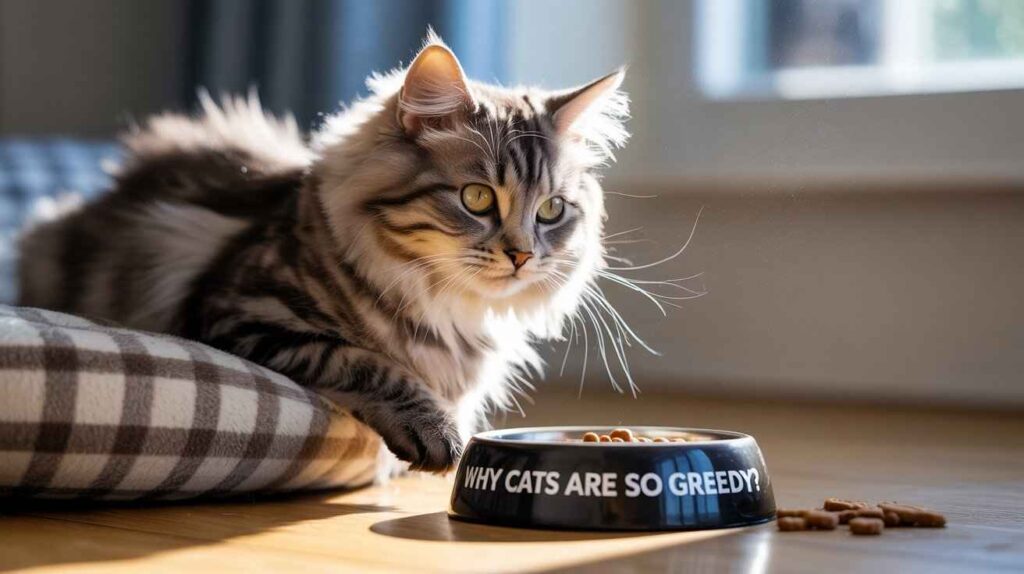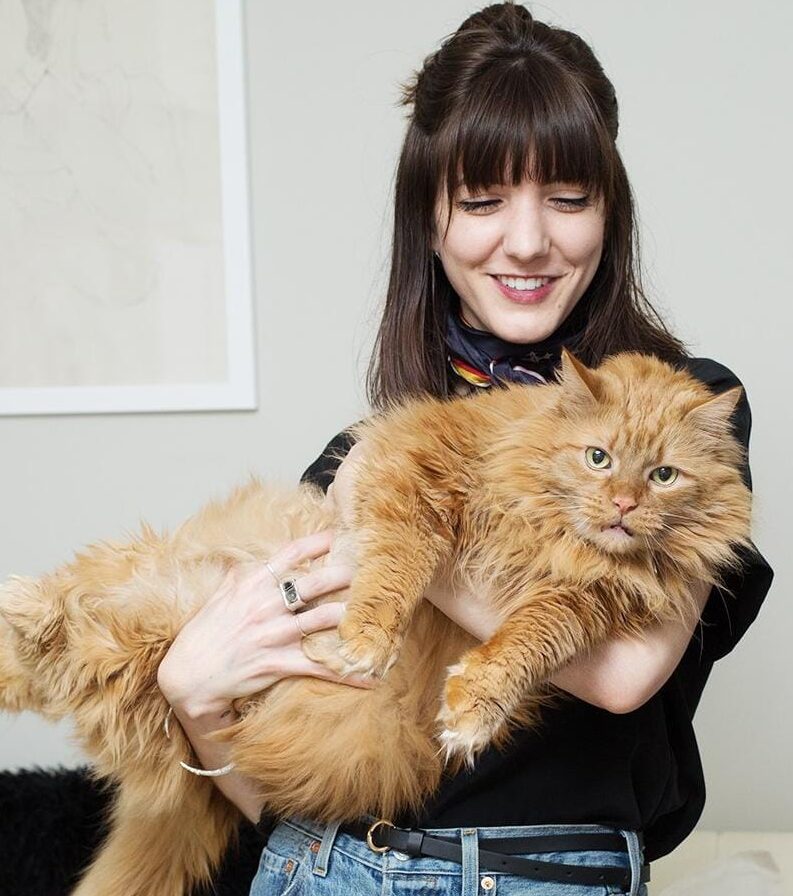Why cats are so greedy? : 5 surprising reasons: 1. Instincts 2. Competition 3. Treats 4. Boredom 5. Nutrient needs.
Why Cats Are So Greedy?
Have you ever wondered why your cat never seems full, no matter how much you feed them? Many cat owners deal with this funny yet confusing behaviour every day.
Your cat meows near the food bowl, steals treats, or follows you to the kitchen even after eating. But here’s the truth — cats aren’t always greedy because they’re hungry.
Sometimes, this behaviour hides emotional or health-related causes. In this article, we’ll explore the five most surprising reasons why cats act greedily, and how you can help them stay happy, calm, and healthy.
Main Reasons Cats Seem So Greedy
| Category | What It Means | Example |
|---|---|---|
| Natural Instincts | Cats are hunters by nature and expect frequent small meals. | Begging even after eating. |
| Medical Problems | Illnesses like diabetes or worms increase hunger. | Eats a lot but loses weight. |
| Diet Issues | Low-protein or high-carb foods don’t fill them up. | Meowing for more food soon after meals. |
| Behavioral Habits | Learned begging or boredom eating. | Pawing or meowing for snacks. |
| Feeding Routine | Irregular meal times cause food anxiety. | Always waiting near the bowl. |
1. Stress
Stress can make cats eat more than usual. When a cat feels nervous or uncomfortable, they might use food as a way to cope.
Moving homes, loud noises, or changes in routine can all make your cat feel uneasy. This is known as comfort eating — a common reaction in both humans and animals.
How to help:
Keep your cat’s surroundings peaceful. Give them a private corner, a soft bed, and stick to a regular feeding schedule. Predictability helps cats feel secure, which in turn reduces stress-driven eating.
2. Fleas
Fleas can make cats restless, itchy, and frustrated. A cat dealing with flea bites often bites or licks its skin repeatedly, which can appear as strange grooming or restlessness.
This discomfort can cause them to become preoccupied with eating or seeking attention.
Solution:
Check your cat’s skin and fur regularly. If fleas are present, use a vet-approved flea treatment and wash their bedding often. Keeping your cat clean and flea-free will quickly calm their behaviour.

3. Allergies
Cats can be allergic to certain foods, dust, or specific materials. When their body reacts, it may lead to itchiness, discomfort, and changes in hunger.
Some allergic cats eat more in an attempt to soothe themselves, while others may lose their appetite.
Common signs:
Vomiting, diarrhoea, or excessive licking around the paws and belly.
What to do:
Consult with your veterinarian about allergy-friendly or grain-free food options. Sometimes, simply changing your cat’s diet can stop this “greedy” behaviour and improve overall health.
4. Anxiety
Cats with anxiety often use food for comfort. They might eat quickly, beg for food, or cry at night.
This typically occurs when a cat feels insecure, lonely, or fearful. New pets, moving to a new place, or a lack of playtime can trigger anxiety.
How to reduce anxiety:
Give your cat more attention and playtime. Interactive toys, gentle petting, and calm music can make a big difference. You can also try puzzle feeders to slow down eating and provide mental stimulation.

5. Overgrooming
When cats overgroom, they lick or bite themselves too much — not because they’re dirty, but because they’re bored or stressed.
This behaviour can make them seem restless or greedy. Overgrooming often starts small but can turn into a habit.
How to fix it:
Offer scratching posts, toys, and short daily play sessions. A busy cat is a happy cat. Boredom is one of the easiest problems to solve once you understand it.
Emotional vs. Physical Causes of Cat Greediness
| Category | Causes | Common Signs | How to Help |
|---|---|---|---|
| Emotional | Stress, Anxiety, Overgrooming | Fast eating, clingy behavior, loud meowing | Routine, playtime, quiet space |
| Physical | Fleas, Allergies, Pain | Scratching, vomiting, fur loss | Vet check, flea treatment, allergy control |
How to Manage a Greedy Cat
If your cat always acts hungry, these steps can help:
- Stick to a schedule: Feed your cat at the same time daily.
- Avoid free feeding: Don’t leave food out all day.
- Control portions: Follow the feeding amount your vet suggests.
- Add playtime: Play reduces boredom and overeating.
- Monitor weight: Sudden weight changes may indicate health problems.
- Visit the vet: Always rule out medical reasons first.
By keeping your cat’s mind and body active, you’ll see fewer signs of greediness and more balanced behaviour.

FAQs
Q1: Why does my cat act hungry even after eating?
This behaviour may be caused by stress, boredom, or medical issues. Cats also associate feeding with attention, so they might beg for food just to get your notice.
Q2: Can medical problems make cats greedy?
Yes. Conditions such as diabetes, thyroid issues, or parasitic infections can increase appetite. Always consult a vet if your cat’s eating habits suddenly change.
Q3: How can I stop my cat from overeating?
Use smaller meals more often, avoid free feeding, and try puzzle bowls to slow them down while eating.
Q4: Are particular cat breeds greedier than others?
Some breeds, such as Siamese, Bengals, and Maine Coons, have strong appetites and high energy, making them appear hungrier than they actually are.
Q5: My cat steals food from the table — what should I do?
Keep food out of reach and give your cat scheduled meals and engaging toys to distract them. Consistent boundaries teach them better habits.

Hi, I’m Sana Sajid!I’m the voice behind CatsCare.blog, sharing my 10+ years of hands-on cat care experience. With a diploma in animal care, I offer practical tips, trusted advice, and easy-to-follow guides to help keep your cats healthy and happy.
When I’m not writing, I spend time with my own cats or exploring the latest developments in feline health. Follow CatsCare.blog for expert insights and real cat stories!


![A beautiful tabby cat with amber eyes sitting with its paw up, used to illustrate content discussing the reasons for feline salivation and answering [Why do Cats Drool].](https://catscare.blog/wp-content/uploads/2025/12/Why-do-Cats-Drool.jpg)

2 thoughts on “5 Surprising Reasons Why Cats Are So Greedy?”